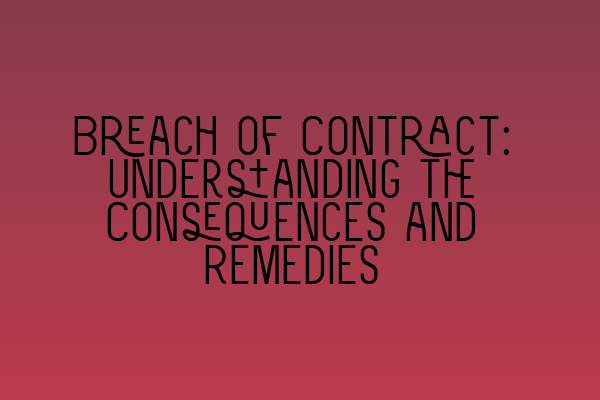`
`Breach of Contract: Understanding the Consequences and Remedies`
`
`
`Introduction`
`
Contracts are the backbone of any business transaction or legal agreement. They establish the rights and obligations of parties involved, ensuring that both sides are protected and held accountable. A breach of contract occurs when one party fails to fulfill their obligations as stated in the agreement. This breach can have serious consequences and may lead to legal action. In this article, we will explore the various consequences and remedies associated with a breach of contract.`
`
`Consequences of Breach of Contract`
`
When a contract is breached, the non-breaching party may experience several negative consequences. These consequences can include financial losses, damage to reputation, and strain on business relationships. For example, if a supplier fails to deliver goods as agreed, the buyer may suffer financial losses due to missed production deadlines or lost sales opportunities. Additionally, the buyer’s reputation may be tarnished if they are unable to fulfill their obligations to their customers.
In some cases, the consequences of breach go beyond financial losses. For instance, if a landlord breaches a rental agreement, the tenant may face the inconvenience of finding new accommodation and moving expenses. Moreover, a breach of contract can lead to significant legal costs if the matter is taken to court. Therefore, it is crucial to understand the available remedies to address and resolve a breach of contract.`
`
`Remedies for Breach of Contract`
`
When a breach of contract occurs, there are several remedies that the non-breaching party may seek. These remedies aim to either enforce the contract or provide compensation for the damages incurred. The choice of remedy depends on the type and severity of the breach. The most common remedies include:
`
`1. Specific Performance`
`
Specific performance is a remedy where a court orders the breaching party to fulfill their obligations as stated in the contract. This remedy is typically used in cases where monetary compensation is not sufficient to rectify the harm caused by the breach. For example, if a rare item is promised to be delivered in a contract, specific performance may be sought if its monetary value cannot be adequately compensated for.
`
`2. Damages`
`
Damages refer to the monetary compensation awarded to the non-breaching party to cover the losses suffered as a result of the breach. There are two types of damages:
– `Compensatory Damages`: These are designed to compensate the non-breaching party for the financial losses incurred due to the breach. For instance, if a construction company fails to complete a project as agreed, the client may seek compensatory damages to cover the cost of hiring another contractor to complete the work.
– `Consequential Damages`: These damages cover losses that are not directly caused by the breach but are a foreseeable result of it. For example, if a supplier fails to deliver raw materials on time, resulting in a delay in production and a loss of sales, the buyer may seek consequential damages to cover the lost profits.
`
`3. Rescission`
`
Rescission is a remedy that cancels the contract and restores both parties to their pre-contractual positions. This remedy is commonly sought when one party has been deceived or coerced into entering the contract. Rescission allows the innocent party to be released from any future obligations and recover any benefits they have already provided.
`
`4. Injunction`
`
An injunction is a court order that restrains or compels a party to act in a certain way. It is usually sought when monetary compensation is not an adequate remedy. For example, if an employee leaves a company and breaches a non-compete agreement, the employer may seek an injunction to prevent the employee from working for a competitor.
`
`Conclusion`
`
Breach of contract can have severe consequences on the parties involved. It is essential for both parties to understand their rights and obligations under the contract, as well as the available remedies for addressing a breach. Seeking legal advice from a qualified solicitor can help navigate the complexities of breach of contract cases and ensure the best possible outcome.
For more insights into legal practice and decision-making, check out our related article: [Unveiling Real-Life Case Studies: Insights into Legal Practice and Decision-Making](https://become-solicitor-sra.co.uk/unveiling-real-life-case-studies-insights-into-legal-practice-and-decision-making/).
If you’re interested in exploring solicitor salaries and factors affecting income, our article on [Exploring Solicitor Salaries in the UK: Average Earnings and Factors Affecting Income](https://become-solicitor-sra.co.uk/exploring-solicitor-salaries-in-the-uk-average-earnings-and-factors-affecting-income/) provides valuable information.
Mastering client relationship management skills is crucial for solicitors looking to enhance trust and loyalty. Discover more in our article: [Mastering Client Relationship Management: Skills for Solicitors to Enhance Trust and Loyalty](https://become-solicitor-sra.co.uk/mastering-client-relationship-management-skills-for-solicitors-to-enhance-trust-and-loyalty/).
If you’re considering a law school education in the UK and need guidance on choosing the right path, our article on [Pursuing a Law School Education in the UK: Choosing the Right Path for Your Future](https://become-solicitor-sra.co.uk/pursuing-a-law-school-education-in-the-uk-choosing-the-right-path-for-your-future/) can provide valuable insights.
Lastly, if you’re interested in becoming a solicitor and want to know more about securing training contracts, check out our article: [Securing Training Contracts: A Roadmap to Becoming a Solicitor](https://become-solicitor-sra.co.uk/securing-training-contracts-a-roadmap-to-becoming-a-solicitor/).
